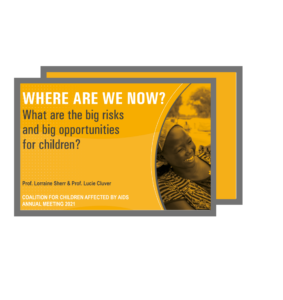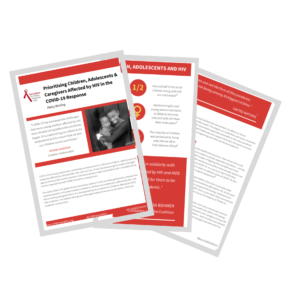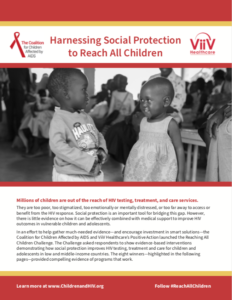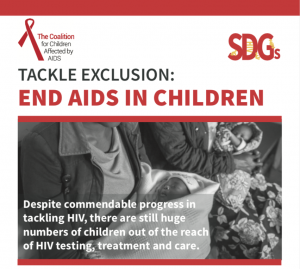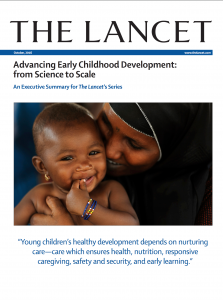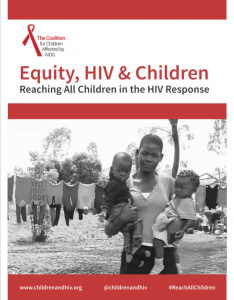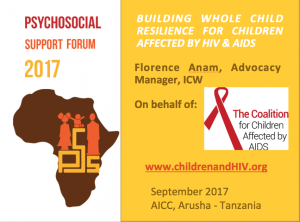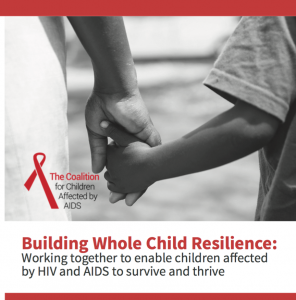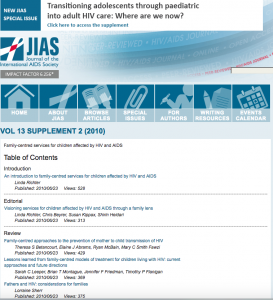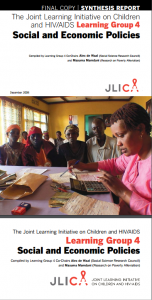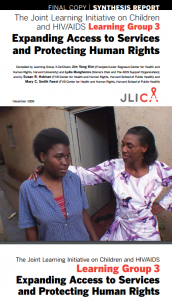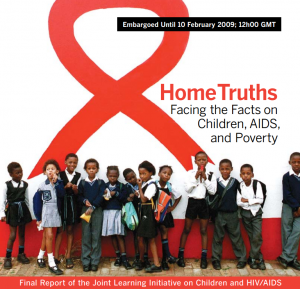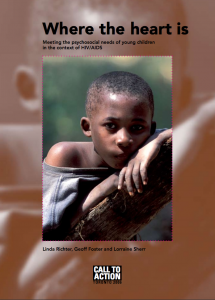A presentation exploring the big risks and big opportunities for children. Anticipating what major challenges and opportunities lie ahead for children and adolescents affected by HIV and their caregivers; and to be ready to address them effectively. Picking up on issues for which there is only emerging evidence, spotting new trends, and identifying forthcoming opportunities that could be of benefit. View the presentation here.
COVID-19 is having catastrophic and lasting consequences for millions of children, adolescents and caregivers affected by HIV and AIDS. The stigma, co-morbidities and socio-economic vulnerabilities associated with HIV and AIDS, leave them especially vulnerable to the new pandemic and its impacts. Lock downs have curtailed livelihoods and the support they rely on in order to survive and thrive. We have published a new Policy Briefing calling for action now to prevent those already made vulnerable by HIV and AIDS from being further impacted; and so as not lose precious gains made against HIV. Read the COVID-19 Policy Briefing now.
Millions of children are out of the reach of HIV testing, treatment, and care services. Social protection is an important tool for bridging this gap. However, there is limited evidence on how it can protect and support vulnerable children and adolescents in testing, treatment and care. In an effort to help gather much-needed evidence, the Coalition for Children Affected by AIDS and ViiV Healthcare’s Positive Action launched the Reaching All Children Challenge and asked respondents to show evidence-based interventions demonstrating how social protection leads to HIVs testing, treatment and care for children in low and middle-income countries. The eight winners — highlighted in pages of this brochure — provided compelling evidence of programs that work.
Despite commendable progress in tackling HIV, there are still huge numbers of children out of the reach of HIV testing, treatment and care. Tackling the exclusion of these children is fundamental to achieving HIV targets. The Coalition for Children Affected by AIDS is calling for differentiated service delivery models, including broader social and economic support, to ensure that all children affected by HIV/AIDS can be tested, treated and cared for. This brief, launched at the AIDS 2018 conference in Amsterdam, highlights the priorities on which the world must focus in order to end AIDS in children.
“The 2016 Lancet Early Childhood Development Series highlights early childhood development at a time when it has been universally endorsed in the 2030 Sustainable Development Goals. This Series considers new scientific evidence for interventions, building on the findings and recommendations of previous Lancet Series on child development (2007, 2011), and proposes pathways for implementation of early childhood development at scale. The Series emphasises ‘nurturing care’, especially of children below three years of age, and multi-sectoral interventions starting with health, which can have wide reach to families and young children through health and nutrition.”
At the AIDSImpact conference in November of 2017, the Coalition issued an advocacy brief highlighting what it will take to reach the poorest, most excluded children for who, advances in HIV treatment, prevention and care remain out of reach.
A the 2017 REPSSI Psychosocial Support Forum, Coalition member Florence Anam spoke of the necessity of tackling social and economic barriers preventing the poorest, most excluded HIV-affected children and families from accessing the care, support and treatment they need.
We are now at a turning point in international development. It is largely the poorest and most excluded children and families who remain out of reach and who are most affected. HIV is no exception. What will it take to ensure that these children survive and thrive? There is a wealth of evidence to show that children and families affected by HIV and AIDS need integrated, holistic support, combining biomedical, economic and social interventions. Psychosocial support is critical, in this regard.
In 2010, Coalition member Professor Linda Richter, guest edited a special issue of the Journal of the International AIDS Society, focused entirely on family-centred services for Children Affected by HIV. The full issue is available here.
This report makes the case for redirecting the response to hiv and aids to address children’s needs more effectively. Drawing on the best body of evidence yet assembled on children affected by aids, it shows where existing approaches have gone off track and what should now be done, how, and by whom.
Where the heart is: Meeting the psychosocial needs of young children in the context of HIV/AIDS is an opinion piece developed through a series of four workshops organised by the Bernard van Leer Foundation entitled “On the Road to Toronto.”

